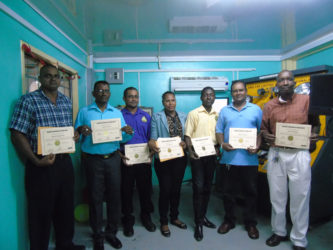The New Amsterdam Technical Institute (NATI), as part of a pilot project to offer eight courses, on Friday commissioned a simulator room to complement the delivery of its Agricultural Machinery programme.
The commissioning ceremony also saw seven lecturers attached to the Agricultural Machinery department being officially certified to use the equipment. The initiative was made possible through the collaboration of NATI, Machinery Corporation of Guyana (MACORP) and World University Service of Canada (WUSC).
Pierre Giroux, High Commissioner of Canada to Guyana in giving brief remarks at the commissioning said “this is a great opportunity in which the institution would increase its capacity to better serve the changing demand in the market environment in which we work”. Giroux noted that agriculture, particularly in developing countries, is still an important part of their gross domestic product and as such, what his government hopes to achieve “is really help the Caribbean to not only increase their food security and create economic growth, but also generate economic opportunities”.
In 2012 NATI purchased three simulators (DL DM04 Multi Point Injection & Ignition System Trainer, DL DM14 ABS Anti-lock Braking System Trainer and DL DM02 Car lighting, power and signaling) to use as part of training of students in the Agricultural Machinery course. However for several years, the simulators were left dormant because the staff of the department lacked the relevant operational skills to use the equipment. This resulted in students being unable to benefit from training incorporating the simulators which offer a safe and risk-free virtual environment for learning.

The Canadian-funded WUSC through its Promotion of Regional Opportunities for Produce through Enterprises and Linkages (PROPEL) initiative facilitated the linkage between NATI and MACORP. MACORP’s training officer Hugh Griffith held instructional classes for the seven lecturers from August 29 to September 8, 2016 at NATI. WUSC covered the cost of travel, accommodation and meals for the trainer during that period.
“We are indeed very grateful for WUSC’s initiative of facilitating the linkage between NATI and Machinery Corporation of Guyana (MACORP), to ensure that the training was given to the staff,” NATI’s principal Maxene Thompson said.
At the end of the training, the seven participants were able to demonstrate operator safety, carry out recommended maintenance procedures and demonstrate basic operation techniques which they will now be able to teach to their students.
Meanwhile, WUSC also provided NATI with an energy efficient Air Conditioning unit for the simulator training room to ensure that the room is conducive for learning and supports better storage of the equipment. Additionally, WUSC supported some minor modifications to the simulators to make them operational.
“This is not the first venture that NATI has embarked on with WUSC,” Thompson disclosed. Elaborating, she noted that in July 2015 “the plantain project was established, however due to the harsh weather it did not bear much fruit”.
Commenting on WUSC’s involvement in Guyana and the Caribbean by extension, Doug Graham, Director of WUSC said they “are trying to enhance the quality and quantity of agricultural produce that gets from the producers into the high value markets”. To this end, WUSC “uses a market systems approach that takes into account all the stakeholders not just the producers and buyers, we are looking at the input suppliers, research institutes, we work with government agencies and private sector” Graham stated. “The institute had equipment, it had a room, we just provided a little bit of support to enable it to get mobilized. We now have instructors at the facility that will now be able to use the equipment and train the next generation in agricultural machine repair”, he added.
Since collaborating with NATI, MACORP has expressed an interest in using the NATI Agriculture Machinery Programme as a feeder of students into MACORP’s 2 year Technician Programme.









